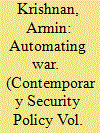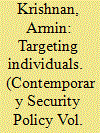| Srl | Item |
| 1 |
ID:
087337


|
|
|
|
|
| Publication |
2009.
|
| Summary/Abstract |
New technological developments in the area of robotics and artificial intelligence have made robotic weapons systems of increasing autonomy possible. Although thousands of unmanned systems have been deployed, the vast majority are unarmed, used primarily for reconnaissance or removal of explosives. But deployment of armed robotic weapons has begun and promises to accelerate rapidly in the next decade. This article begins by proposing definitions of autonomous or robotic weapons, outlines the most important obstacles to their introduction, and options for arms control. It makes three claims: first, robotic weapons such as unmanned vehicles could largely replace human soldiers in the battlespace in one or two decades; second, for technical, economic, and operational reasons robotic weapons will become increasingly autonomous; finally, these new types of conventional weapons could result in new dangers to international security that should be addressed before the weapons are introduced and proliferate widely. It is suggested that an outright ban would be unlikely to be successful and that it may not even be desirable. A ban of particular types of offensive automatic weapons (AW) and special provisions on defensive types would make most sense.
|
|
|
|
|
|
|
|
|
|
|
|
|
|
|
|
| 2 |
ID:
165673


|
|
|
|
|
| Summary/Abstract |
Pro-insurgency paramilitary operations (PMOs) are a rare type of covert action that aim to destabilize or overthrow a hostile government or defeat nonstate groups with no cooperation from a host government. The article analyzes US covert operations in Syria since 2011 by applying Principal–Agent Theory (PAT) to explain the inherent difficulties involved in controlling partner states and proxies. The nature of pro-insurgency PMOs is such that main tasks have to be delegated to partners and proxies, which reduces the ability of the US government to achieve desirable outcomes, especially whenever the goals of the partners and proxies are not well-aligned with US objectives as is the case in Syria.
|
|
|
|
|
|
|
|
|
|
|
|
|
|
|
|
| 3 |
ID:
122999


|
|
|
|
|
| Publication |
2013.
|
| Summary/Abstract |
Targeted killing is not new. What has changed is the nature of armed conflict, states that openly admit to the practice, and the emergence of much more capable technology. Targeting individuals seems to make sense given the changing nature of armed conflict. But whether targeting dangerous individuals is indeed legal, effective, and ethical is often impossible to determine, either in specific cases or systematically, because of the secrecy surrounding such operations. Calls from civil society and legislatures for greater transparency in targeted killings are unlikely to result in more openness or accountability, easily denied by the precedence of security claims for these intelligence-driven operations and covert actions. This barrier also makes it very difficult to develop consistent domestic and international rules for targeting individuals outside war zones. If states became more transparent about how and why individuals are targeted, the approach could gain more legitimacy. Rather than giving states a blanket legal authority of secretly killing individuals they deem terrorists or threats to national security, a workable solution could be a systematic preference to rely on non-lethal means in targeted counterterrorism operations with the aim of subsequent prosecution of captured individuals. A systematic preference for non-lethality should be accompanied by a requirement for the humane treatment of detained terrorists/combatants and a requirement for a fair trial after a specified period of detention. Secret prisons and indefinite detentions of terrorism suspects not charged with any crime should not be permissible practices in democratic states.
|
|
|
|
|
|
|
|
|
|
|
|
|
|
|
|
| 4 |
ID:
081872


|
|
|
|
|
| Publication |
Hampshire, Ashgate Publishing Limited, 2008.
|
| Description |
x, 207p.
|
| Standard Number |
9780754671671
|
|
|
|
|
|
|
|
|
|
|
|
Copies: C:1/I:0,R:0,Q:0
Circulation
| Accession# | Call# | Current Location | Status | Policy | Location |
| 053526 | 338.47355/KRI 053526 | Main | On Shelf | General | |
|
|
|
|